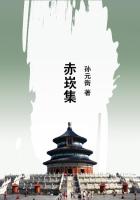And yet, for a day or two he resolved not to speak of his terror. The Senora was so happy in his presence, and she had such kind confidences to give him about her plans for her children's future, that he could not bear to alarm her. And the children also were so full of youth's enthusiasms and love's sweet dreams. Till the last moment why should he awaken them? And as the strongest mental element in a home gives the tone to it, so Dare and Antonia, with the doctor behind them, gave to the Mexican household almost an American ******* of intercourse and community of pleasure.
The Senora came to the parlor far more frequently, and in her own apartments her children visited her with but slight ceremony. They discussed all together their future plans.
They talked over a wonderful journey which they were to take in company to New Orleans, and Washington, and New York, and perhaps even to London and Paris--"who could tell, if the Senora would be so good as to enjoy herself?" They ate more together. They got into the habit of congregating about the same hearthstone. It was the Senora's first real experience of domestic life.
In about six days the Mexican forces left the city. The terms of surrender granted General Cos struck the Mexicans with a kind of wonder. They had fought with the express declaration that they would take no American prisoner. Yet the Americans not only permitted Cos and his troops to leave under parole of honor, but gave them their arms and sufficient ammunition to protect themselves from the Indians on their journey home.
They allowed them also all their private property. They furnished them with the provisions necessary to reach the Rio Grande. They took charge of their sick and wounded. They set all the Mexican prisoners at liberty--in short, so great was their generosity and courtesy that the Mexicans were unable to comprehend their motives.
Even Lopez was troubled at it. "I assure you," he said to Dr.
Worth, "they will despise such civility; they will not believe in its sincerity. At this very blessed hour of God, they are accusing the Americans of being afraid to press their advantage. Simply, you will have the fight to make over again. I say this, because I know Santa Anna."
"Santa Anna is but a man, Lopez."
"Me perdonas! He is however a man who knows a trick more than the devil. One must be careful of a bull in front, of a mule behind, and of a monk and Santa Anna on all sides. At the word monk, Lopez glanced significantly at a passing priest, and Doctor Worth saw that it was Fray Ignatius.
"He sprinkled the Mexican troops with holy water, and blessed them as they left the city this morning. He has the ear of General Cos. He is not a man to offend, I assure you, Doctor."
The doctor walked thoughtfully away. San Antonio was full of his friends, yet never had he felt himself and his family to be in so much danger. And the words of Lopez had struck a responding chord in his own consciousness. The careless bravery, the splendid generosity of his countrymen was at least premature. He went through the city with observing eyes, and saw much to trouble him.
The gates of Alamo were open. Crockett lounged upon his rifle in the Plaza. A little crowd was around him, and the big Tennesseean hunter was talking to them. Shouts of laughter, bravas of enthusiasm, answered the homely wit and stirring periods that had over and over "made room for Colonel Crockett," both in the Tennessee Legislature and the United States Congress. His rifle seemed a part of him--a kind of third arm. His confident manner, his manliness and bravery, turned his wit into wisdom. The young fellows around found in him their typical leader.
The elegant James Bowie was sitting on the verandah of the Veramendi House, calmly smoking. His fair, handsome face, clear blue eyes and mild manners, gave no indication of the gigantic physical strength and tremendous coolness and courage of the man who never tolerated an enemy in his presence.
Burleson and Travis were talking under the shade of a China tree, and there were little groups of American soldiers on every street; this was what he saw, and yet a terrible sense of insecurity oppressed him.
The city, moreover, was not settling to its usual business, though there were many preparations for public and private entertainments. After passing Colonel Bowie, he met David Burnett. The shrewd statesman from New Jersey had a shadow upon his face. He stopped Doctor Worth and spoke frankly to him. "We are in greater danger now than when we were under fire," he said. "Santa Anna will come on us like a lion from the swellings of Jordan. I wish Houston knew our position as it really is. We must either have more men to defend this city or we must blow up the Alamo and be ready to leave it at a moment's notice."
"Why were such favorable terms given to General Cos and his troops? I cannot understand it."
"I will tell you an amazing fact. When Cos ran up that white flag on the Alamo, we had not a single round of ammunition left; complaisance was necessary until Cos made over to us the Mexican arms, ammunition, property and money."
Worth turned and looked at the fort. A great red flag on which was the word T-E-X-A-S floated from its battlements, and there were two men standing on its roof, with their faces westward.
"They are the lookouts," said Burnett, "and we have scouts through the surrounding country; but Santa Anna will come, when he comes, with tens of thousands."
"And there is a line where even the coolest courage and the most brilliant bravery succumbs to mere numbers--Eh!"
"That is what I mean, Doctor."
"Where is Houston?"
"On the Brazos, at the small town of Washington. The council have established headquarters there."














